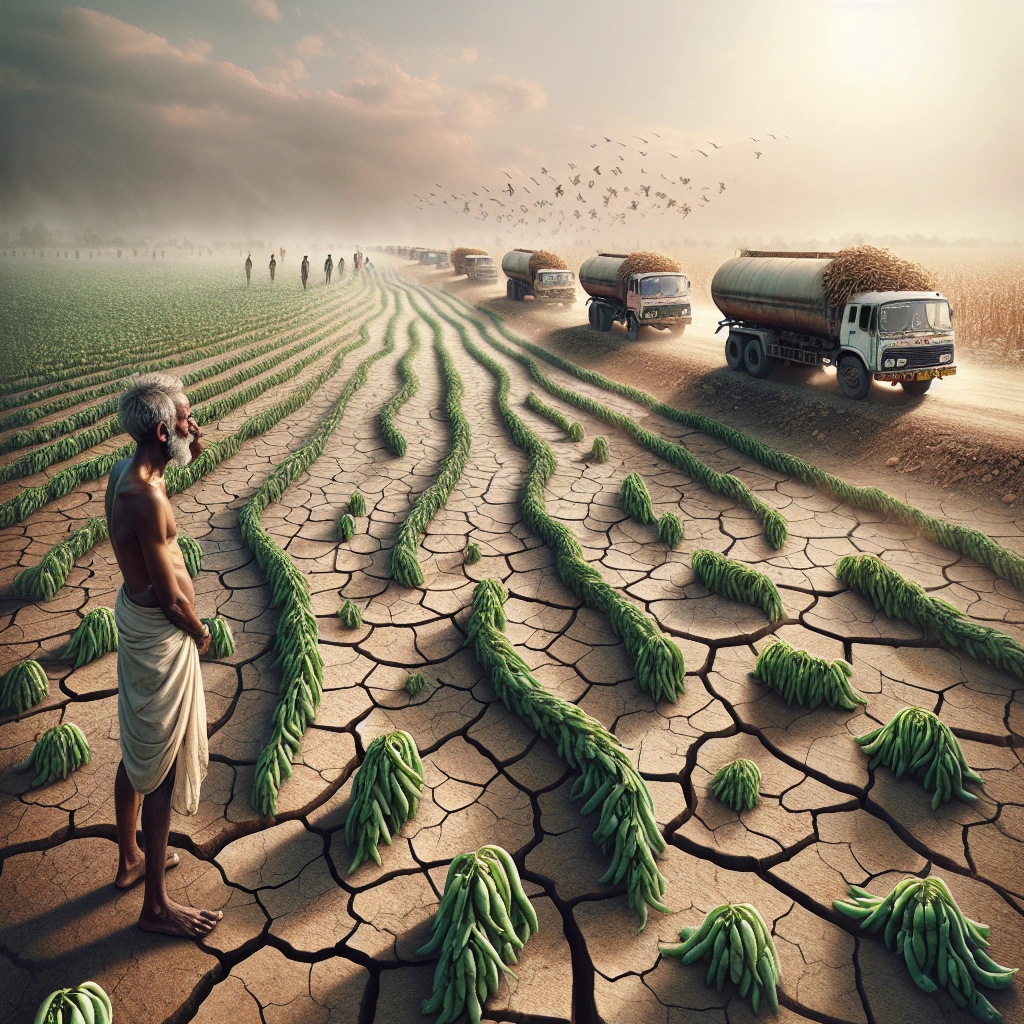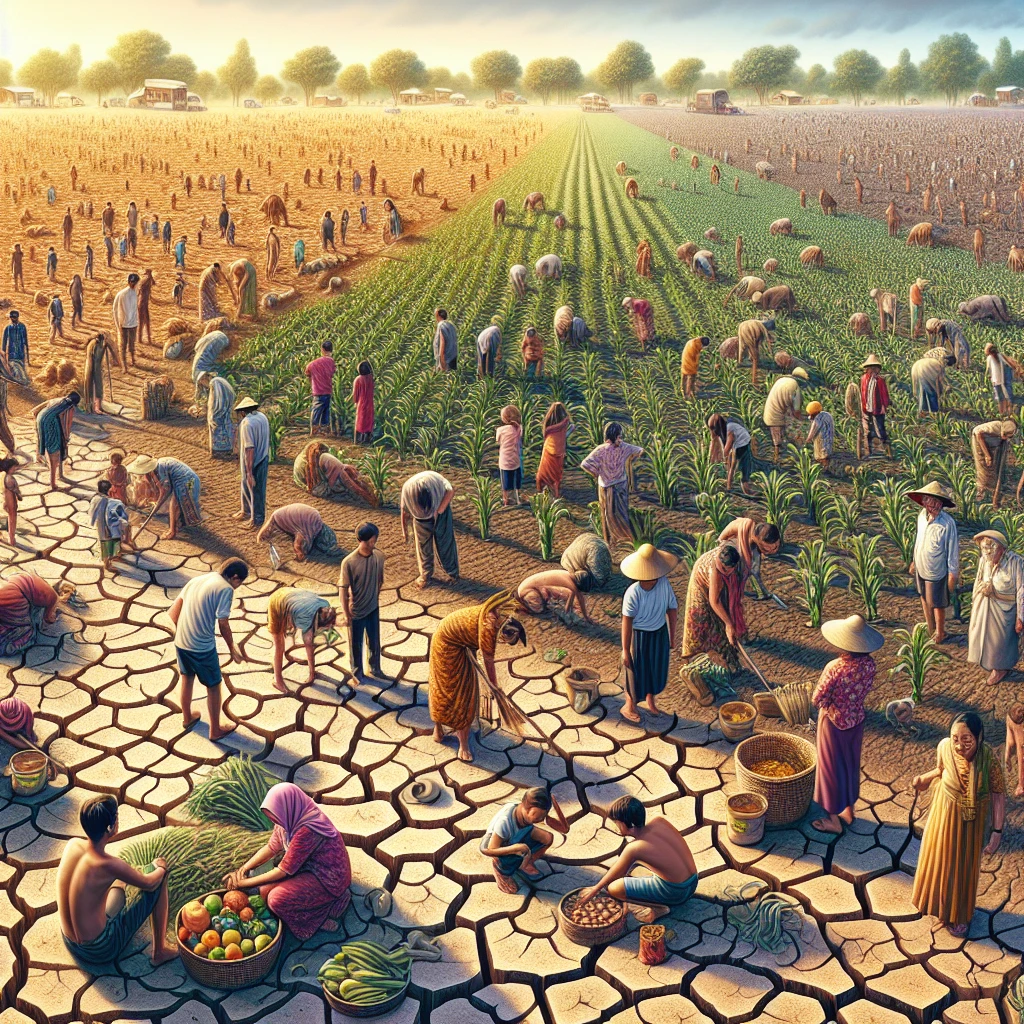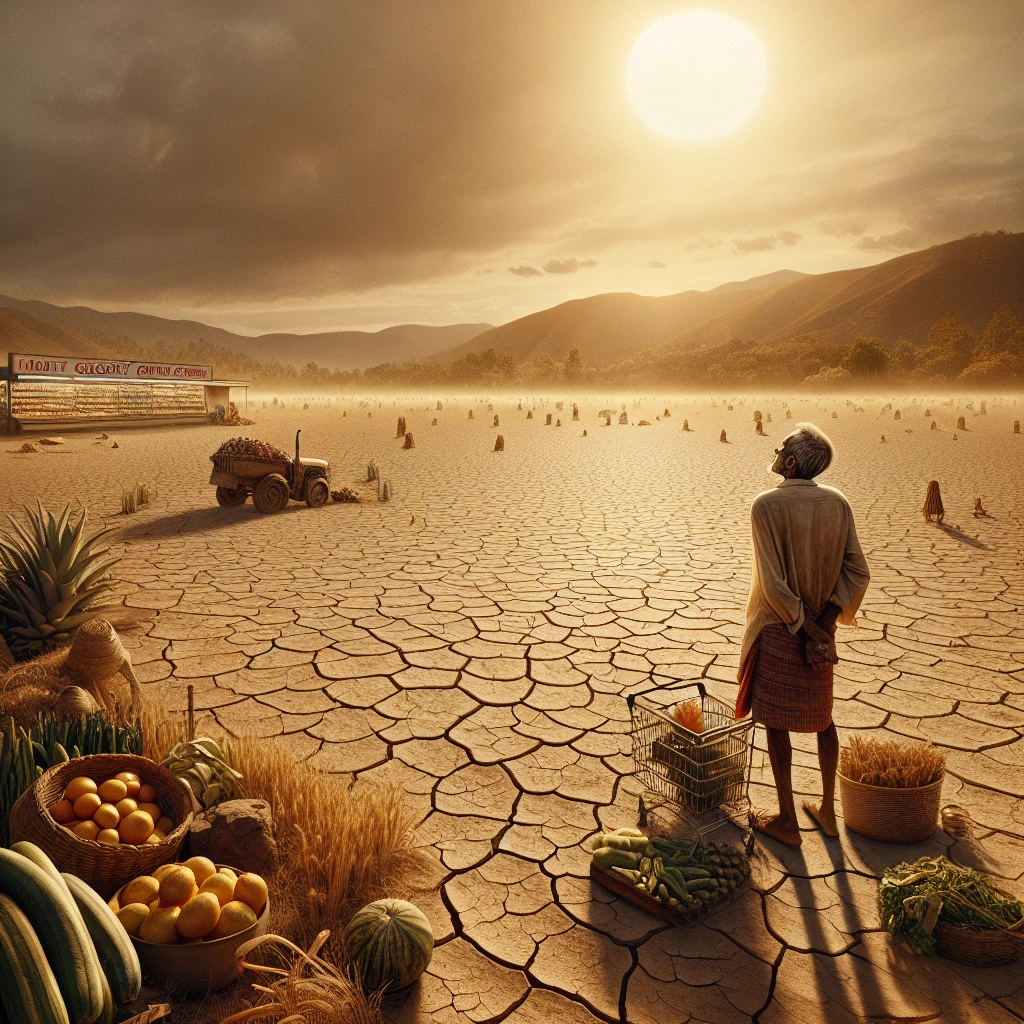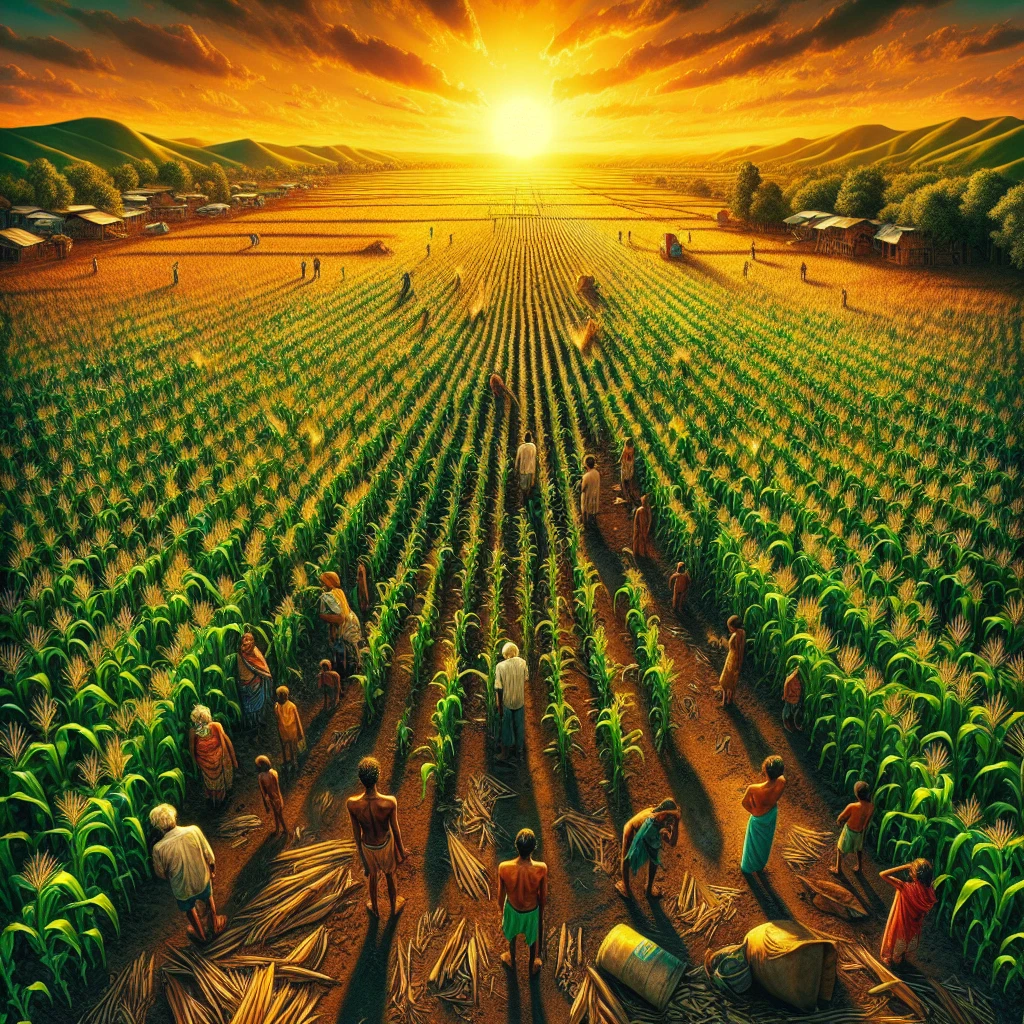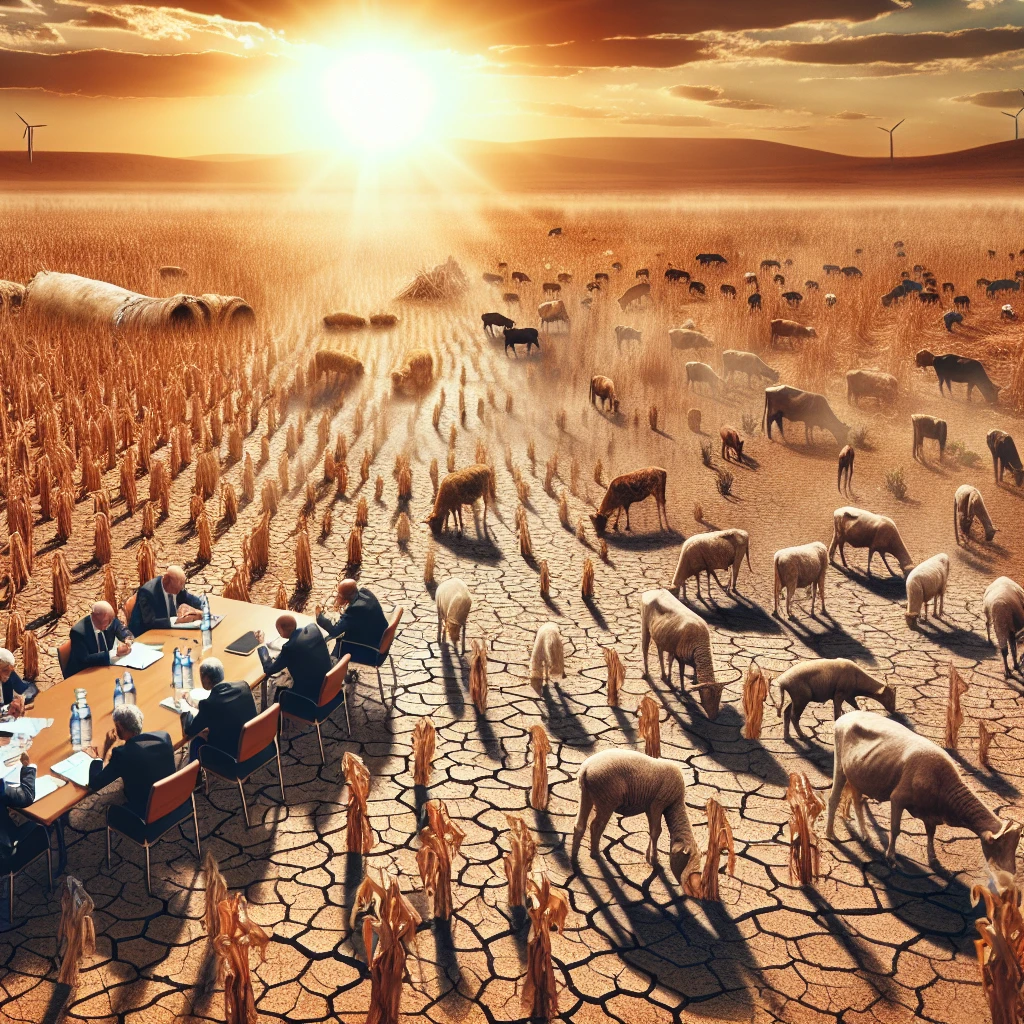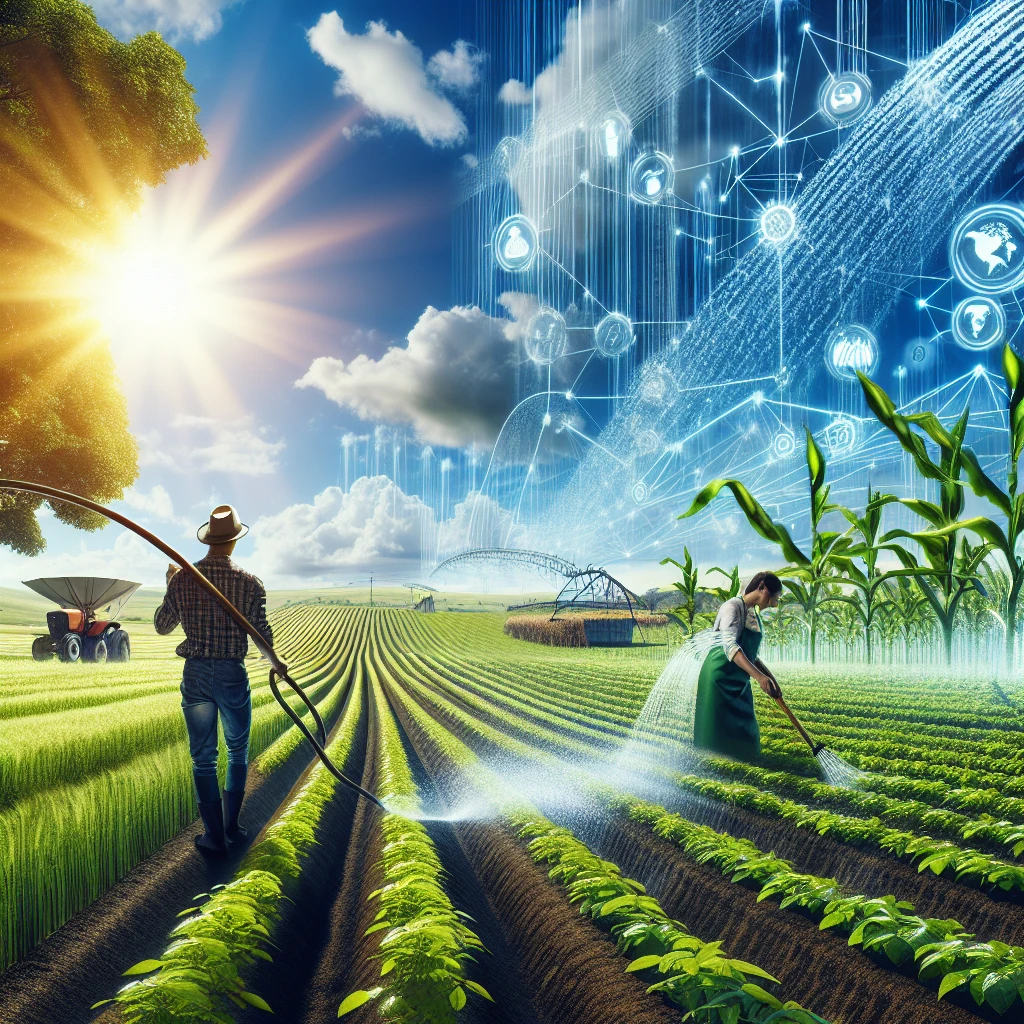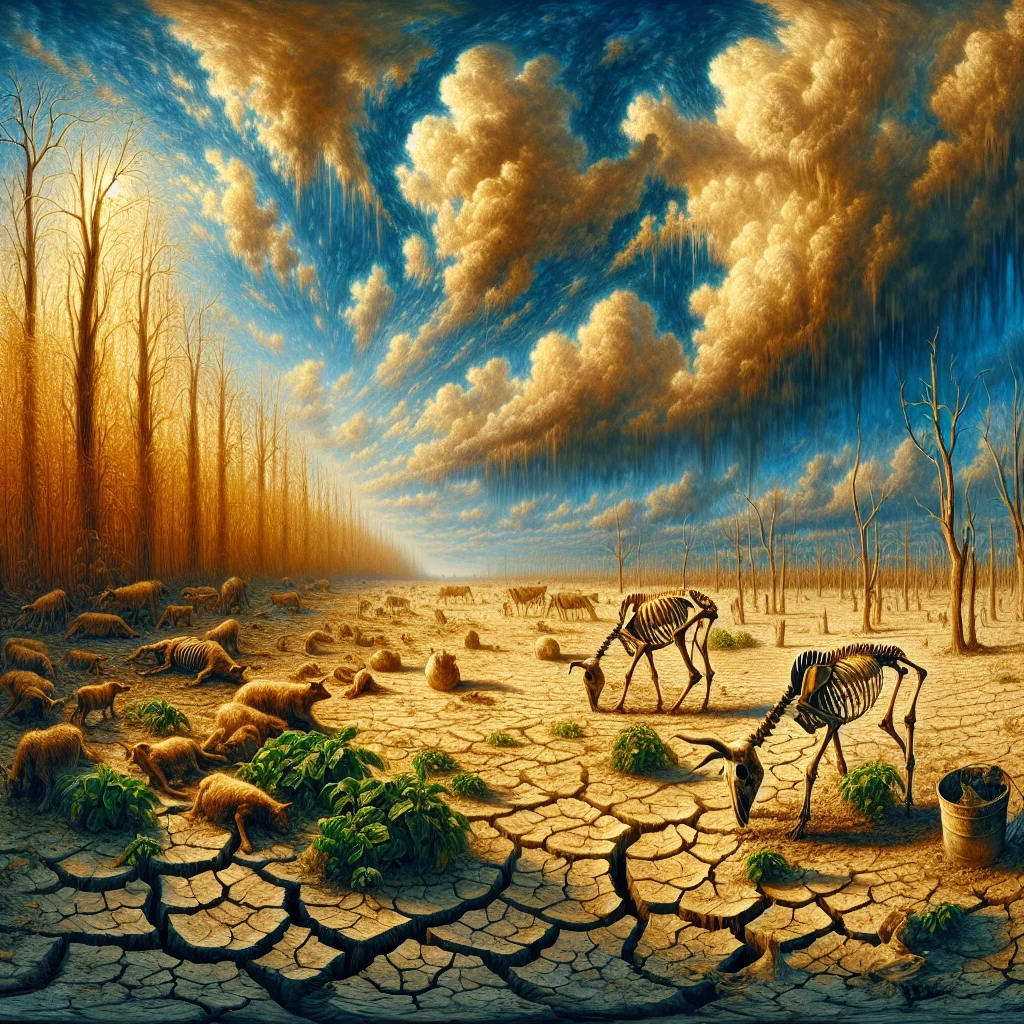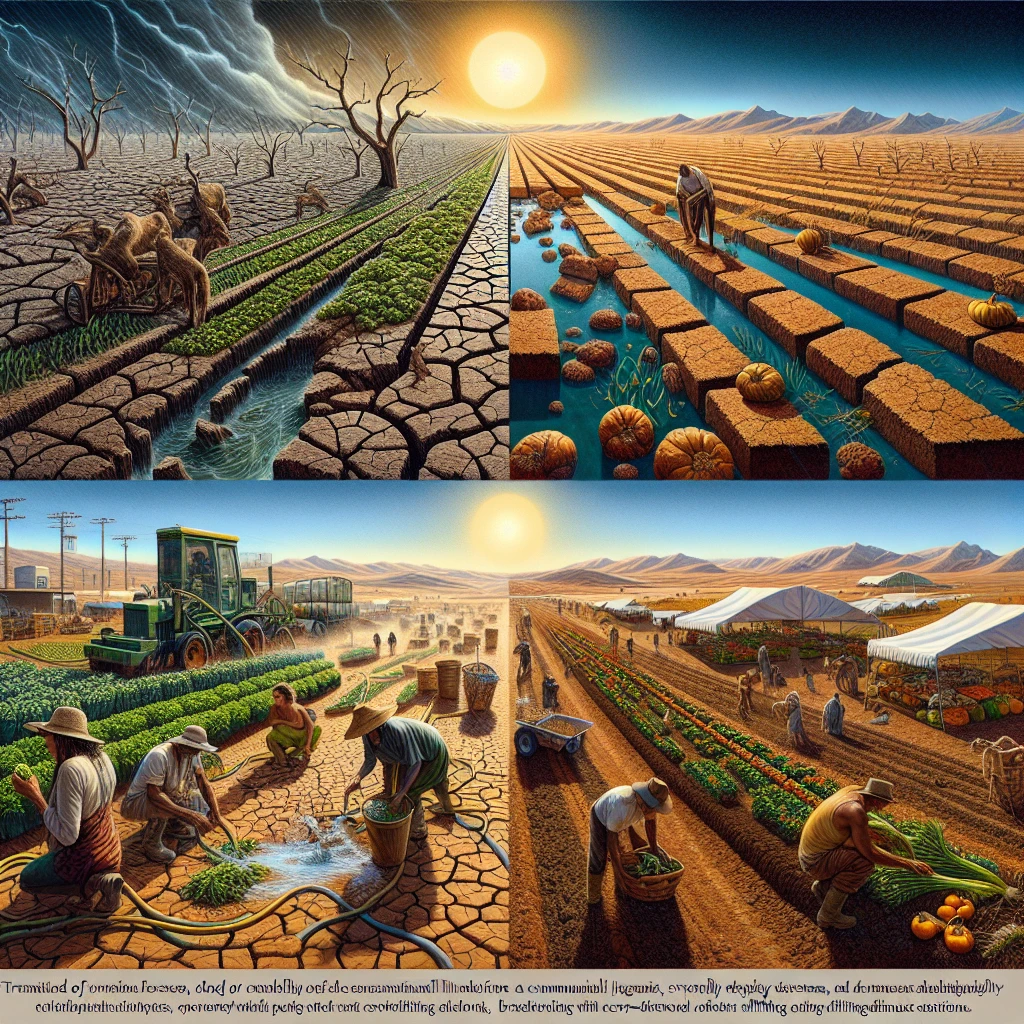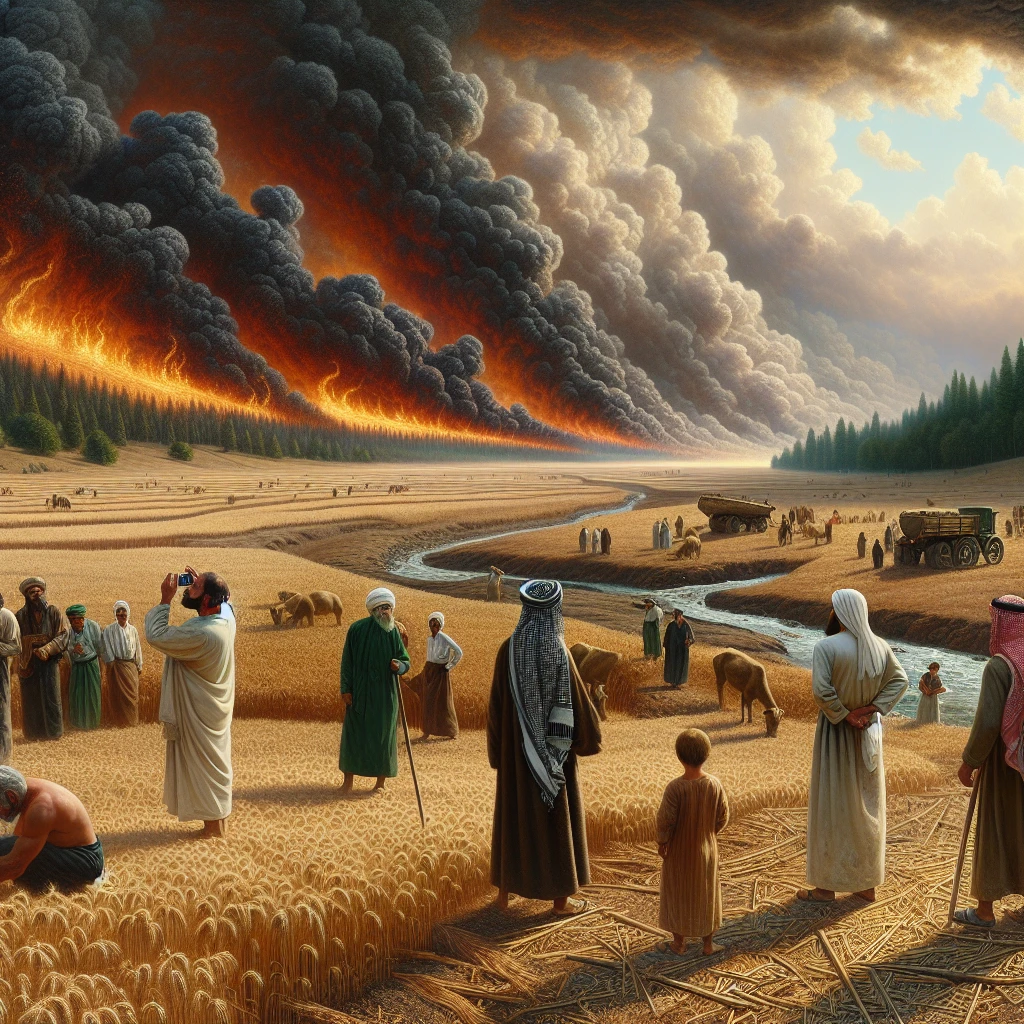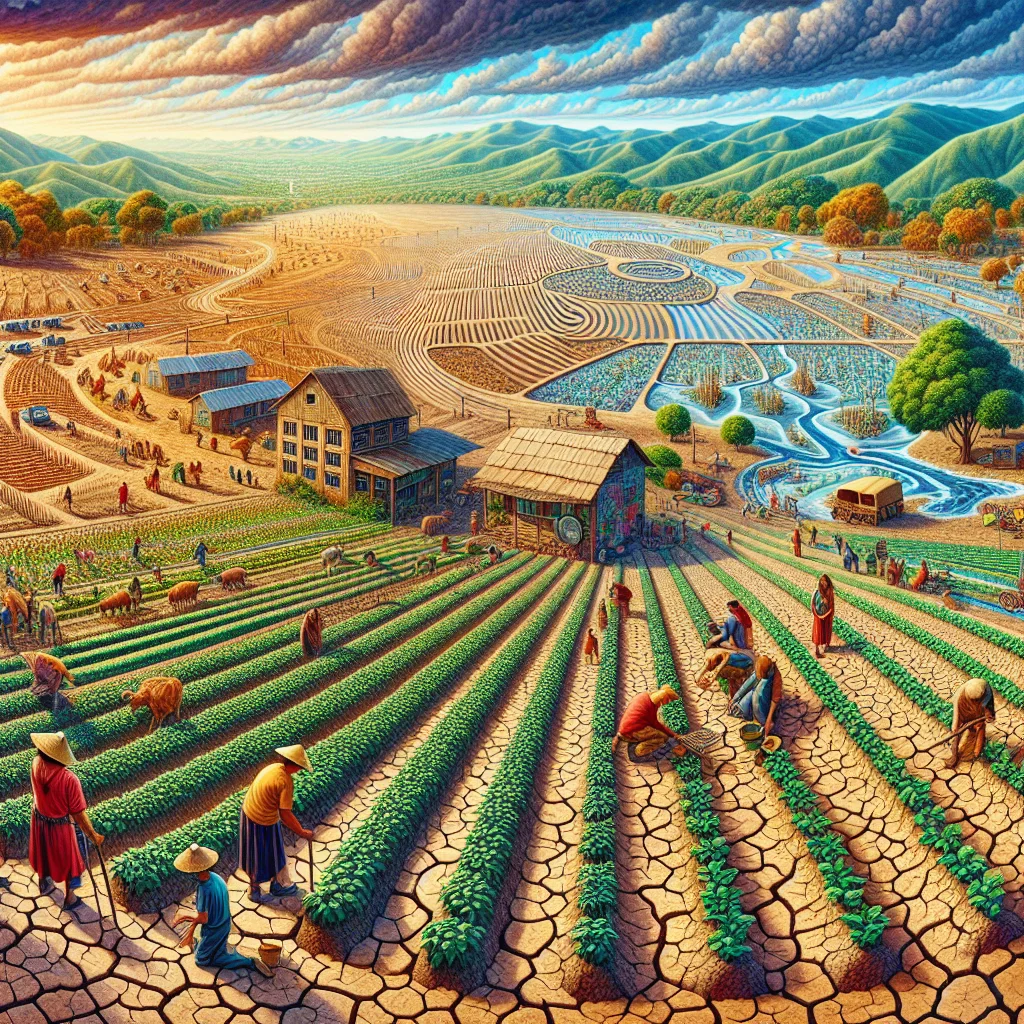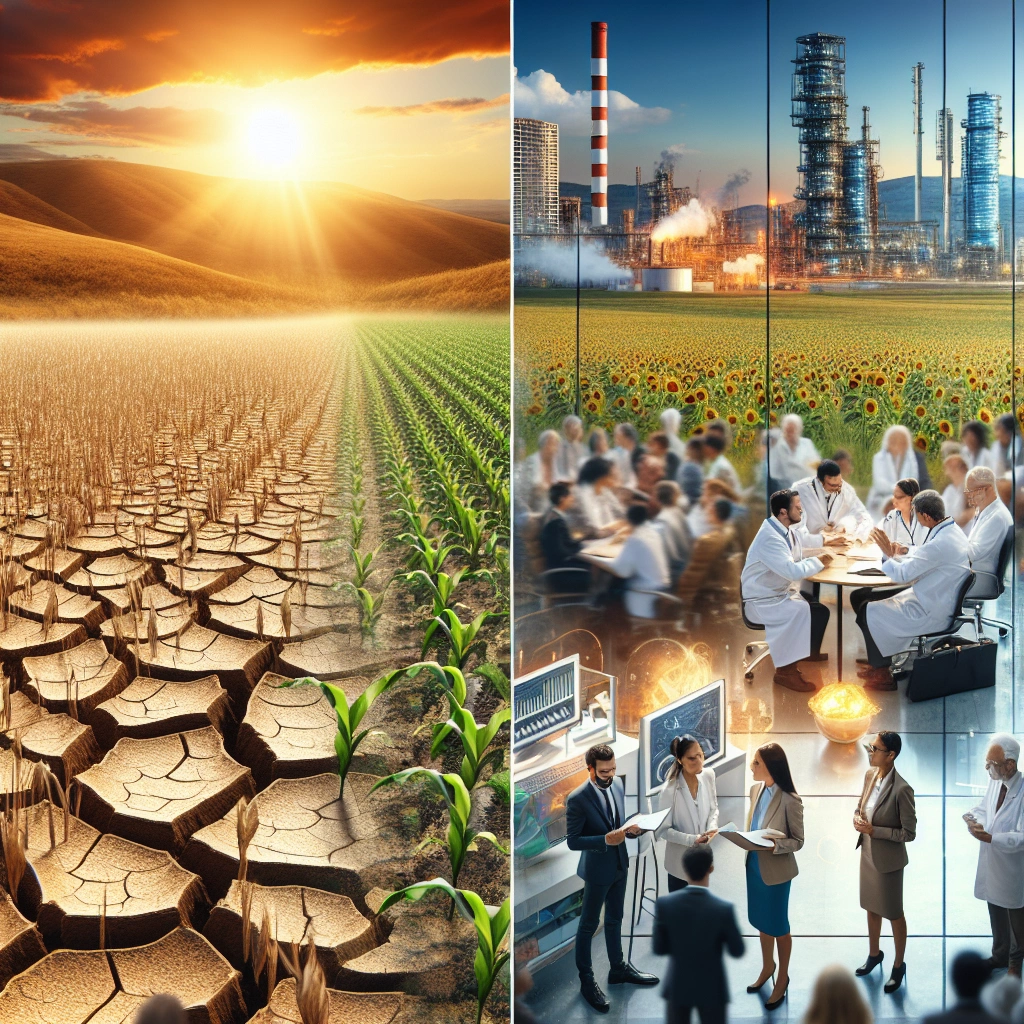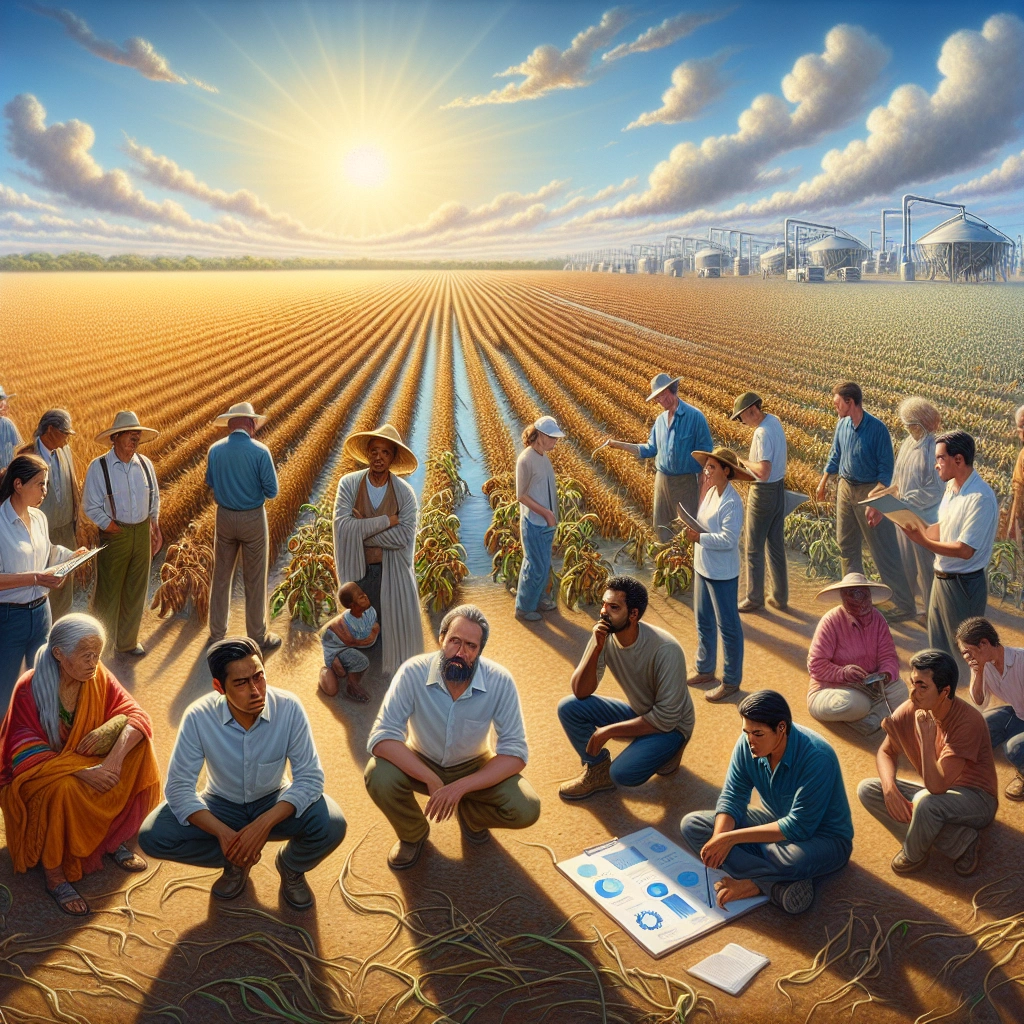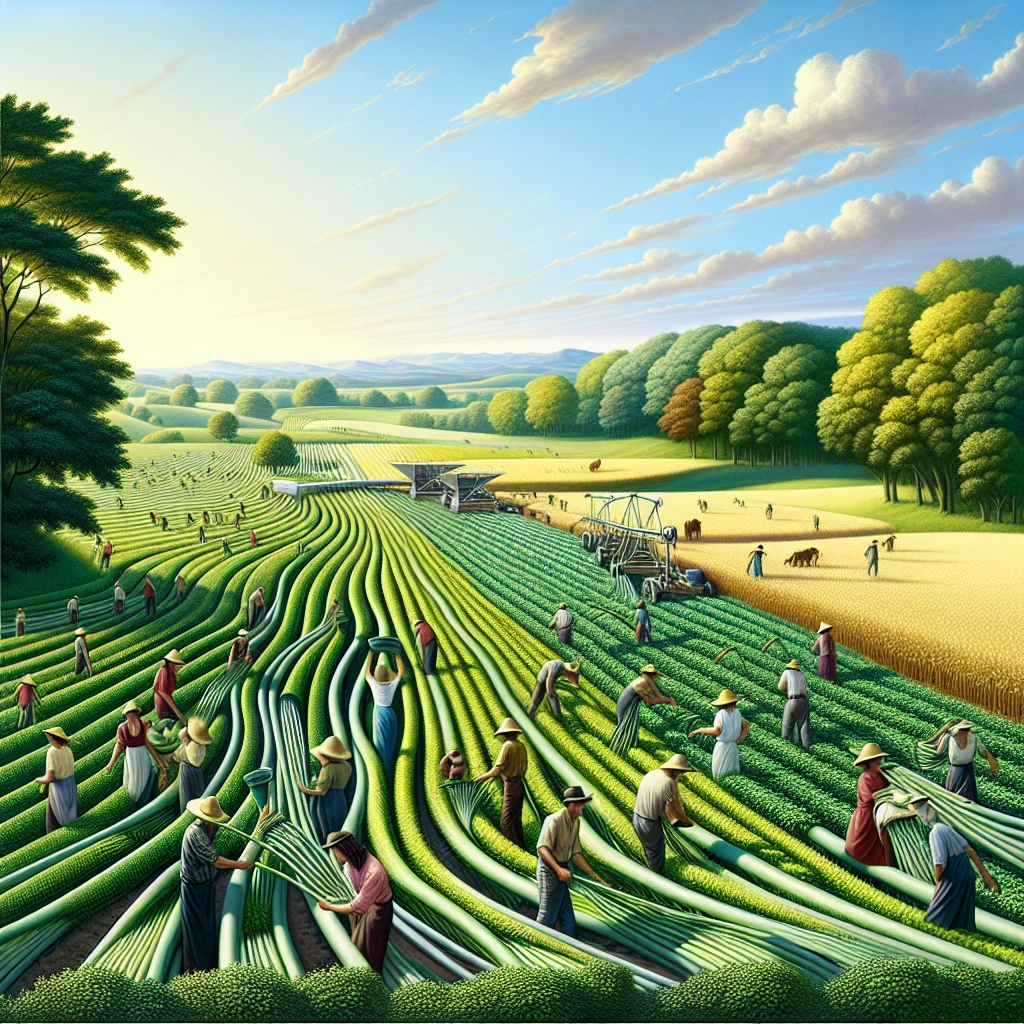

Global food security refers to the ability of all people to have access to sufficient, safe, and nutritious food at all times. Climate change has significantly impacted global food security by causing extreme weather patterns such as heat waves, droughts, floods, cyclones, and wildfires, making it challenging for farmers to grow food and for individuals to access it.
Addressing the impact of climate change on global food security is crucial to ensure that people have adequate access to food for an active and healthy life in the contemporary world.
Check out this Youtube video: Learn about the impact of climate change on global food security in today’s world and how it affects the U. S. food system.
The Relationship Between Climate Change and Food Security
Direct impact of climate change on food production
Heavy precipitation due to climate change can lead to soil erosion, deplete soil nutrients, and increase agricultural runoff, affecting crop yields and quality. Additionally, extreme weather events such as heat waves and droughts can harm livestock, disrupting meat production and agricultural productivity.
Influence of climate change on the availability and access to food
Climate change can disrupt food availability, reduce access to food, and affect food quality, impacting not only crops but also meat production and fisheries. Changes in temperature and rainfall patterns can lead to longer growing seasons, affecting the overall stability and access to food sources.
Effect of extreme weather events on agricultural productivity
Extreme weather events, including floods and droughts, can harm crops, reduce yields, and cause significant yield reductions in some years, impacting agricultural productivity and contributing to potential food shortages.
| Climate Change Impact | Examples |
|---|---|
| Soil Erosion | Crop yield reduction |
| Heat Waves | Livestock harm |
| Longer Growing Seasons | Changes in food availability |
Climate change has a profound impact on food production, availability, and access, as well as agricultural productivity. It is crucial to address these challenges to ensure global food security in the contemporary world.
Climate Change’s Impact on Agricultural Systems
Changes in crop yields due to climate change
Extreme temperature and precipitation variations from climate change can severely impact crop yields. More frequent heavy precipitation can erode soil, while droughts can lead to reduced yields.
For instance, maize and wheat production could see significant declines and growth, respectively, as early as 2030, affecting global food supply. The lack of water and warmer temperatures further exacerbate these challenges, making it harder for crops to thrive and leading to less productive land.
Vulnerability of small-scale farmers to climate change effects
Small-scale farmers are particularly vulnerable to the effects of climate change. Most rely on rain-fed agriculture, cultivate marginal areas, and lack access to modern technologies.
Additionally, the increasing unpredictability of growing conditions poses a significant threat to their livelihoods, as the lack of resources and infrastructure hinders their ability to adapt swiftly. This vulnerability could potentially lead to reduced crop production and food insecurity within communities.
Technology and innovation in adapting to climate change in agriculture
In the face of climate change, harnessing agricultural technologies becomes crucial for adapting farming systems. The introduction of IoT for water management, as seen in countries like Brazil, Italy, and Spain, is a prime example of innovation benefiting agriculture.
Implementing climate-smart agriculture techniques, such as utilizing satellite technology, proves paramount in aiding farmers to navigate the challenges posed by climate change. Moreover, building sustainable practices with emerging tech is essential for enhancing resilience and maintaining food security in the contemporary world.
| Challenges Faced by Small-scale Farmers due to Climate Change | Technological Innovations for Climate Change Adaptation |
|---|---|
| Reliance on rain-fed agriculture | Introduction of IoT for water management |
| Cultivation in marginal areas | Implementation of climate-smart agriculture techniques |
| Limited access to modern technologies | Adoption of sustainable practices with emerging tech |
The changes in crop yields, vulnerability of small-scale farmers, and the role of technology and innovation in adapting to climate change in agriculture demonstrate the critical need for sustainable practices and technological advancements in addressing global food security challenges in the contemporary world.
The Role of Climate Change in Food Distribution
Impact of climate change on food transportation and distribution
Climate change has significantly impacted food transportation and distribution. Adverse climate events such as extreme weather conditions, floods, and heatwaves have increasingly disrupted transit time, delivery reliability, and efficiency, affecting the cost of goods moving through transportation systems.
These disruptions not only escalate food distribution costs but also pose challenges to farmers in exporting their produce to international markets, ultimately influencing global food prices.
Global implications of climate change on food trade and markets
The global implications of climate change on food trade and markets are profound. Changing precipitation patterns, rising temperatures, and an increase in extreme events threaten traditional food systems, making it more difficult for communities to produce, harvest, and access their staple food sources.
Furthermore, the long-term potential impacts of climate change on global food trade networks, particularly for key crops like wheat, have raised concerns about the future stability of food supply chains and trade relationships worldwide.
Access to food and food sovereignty in the face of climate change
Climate change has posed significant challenges to access food and uphold food sovereignty. With an increase in food insecurity due to disruptions in food supply chains, prevailing poverty, and food rights, vulnerable populations are facing acute challenges in accessing an adequate and affordable food supply.
Furthermore, climate change threatens the traditional methods of production and harvesting, impacting food sovereignty, especially for communities that heavily rely on agricultural exports as their primary source of income.
| Climate Change Impact | Implications |
|---|---|
| Disrupted food transportation and distribution | Escalating costs and challenges in exporting produce |
| Global trade network impacts on key crops | Concerns over food supply chain stability |
| Threats to traditional food systems | Difficulty in producing, harvesting, and accessing staple food sources |
| Increased food insecurity | Challenges in accessing adequate and affordable food supply |
Climate change has exerted substantial pressure on food distribution, trade, and access, compelling the need for innovative and sustainable solutions to safeguard global food security in the contemporary world.
Climate Change’s Effect on Food Prices
Influence of climate change on food price volatility
Climate change significantly impacts food price volatility due to its effect on the erratic weather patterns. With more frequent extreme rainfalls, heat waves, flooding, and droughts, grain crop productivity becomes unpredictable, leading to volatile grain prices.
These fluctuations in grain prices have a ripple effect on the overall food pricing, causing instability in the market and impacting affordability for consumers.
Economic implications of climate change on food affordability
The economic implications of climate change on food affordability are profound. A warming planet is already increasing the price of food and could further drive up inflation.
Research indicates that rising temperatures and changing rainfall patterns hold back crop production, leading to significant price rises. This ultimately results in lower food consumption, higher food prices, and increased economic inequality, impacting vulnerable households the most.
Strategies in addressing the impact of climate change on food prices
Addressing the impact of climate change on food prices requires multifaceted strategies. Investing in agricultural infrastructure, diversifying crops and food sources, and developing food storage systems are crucial steps to mitigate the effects of climate change on food production and prices.
Furthermore, managing crops through breeding for drought and temperature tolerance, adjusting irrigation, and implementing sustainable farming practices are essential in ensuring food affordability and security in the face of climate change.
Climate Change and Food Quality
Changes in Nutritional Value of Food Due to Climate Change
Climate change is leading to significant alterations in the nutritional value of food. Research conducted by the Planetary Health Alliance at the Harvard Chan School demonstrated that elevated levels of CO2, as predicted for 2050, can cause food crops like wheat, corn, rice, and soy to lose up to 10% of their zinc, 5% of their iron, and 8% of their protein content.
This is a concerning situation, as it directly impacts the quality of the food available for consumption, potentially leading to widespread nutritional deficiencies.
Impact of Climate Change on Food Safety and Foodborne Illnesses
The implications of climate change on food safety and foodborne illnesses are profound. Changes in climate patterns, such as extreme weather events, erratic rainfall, and rising temperatures, can pave the way for the introduction of toxins and pathogens into crops.
This, in turn, increases the risk of foodborne illnesses, ranging from norovirus infections to salmonellosis. As such, climate change not only influences the nutritional composition of food but also poses significant challenges to ensuring the safety of food supplies.
Addressing Quality Concerns in the Contemporary World
In the contemporary world, it is imperative to address the concerns surrounding the impact of climate change on food quality. This involves implementing robust food safety measures that can adapt to changing environmental conditions.
Moreover, fostering sustainable agricultural practices and promoting dietary diversity are crucial steps in mitigating the negative effects of climate change on food quality. Collaborative efforts from global organizations and policymakers are essential to advance strategies for ensuring food security and addressing nutritional challenges in the face of climate change.
| Prospective Solutions | Description |
|---|---|
| Sustainable Agricultural Practices | Implementing eco-friendly farming techniques to combat the impact of climate change on crop nutritional content. |
| Robust Food Safety Measures | Developing adaptable safety protocols to address the challenges posed by changing climate patterns and their impact on foodborne illnesses. |
| Promotion of Dietary Diversity | Encouraging the consumption of a wide variety of nutrient-rich foods to counteract the potential loss of nutritional value in staple crops. |
| Collaborative Global Initiatives | Engaging in joint efforts on a global scale to address the ramifications of climate change on food quality and security and implement effective strategies. |
By acknowledging the substantial ramifications of climate change on food quality, and taking decisive action, we can strive to avert potential crises and ensure the availability of nutritious, safe, and high-quality food for the global population.
Climate Change’s Impact on Livelihoods and Rural Communities
Displacement and migration due to climate change-related food insecurity
Climate change has significantly contributed to food insecurity, leading to displacement and migration of rural communities. For example, the World Bank estimates that by 2050, over 140 million people could be forced to migrate due to climate change, primarily in regions like sub-Saharan Africa and South Asia.
This demonstrates the dire impact of climate change on the livelihoods and stability of rural communities.
Effect of climate change on rural livelihoods and traditional food systems
The effect of climate change on rural livelihoods and traditional food systems is profound, with rural communities facing immense challenges. Changes in temperature and rainfall patterns directly affect agricultural productivity, leading to reduced food availability and compromised food quality.
Farmers in these areas face struggles in sustaining their livelihoods, posing a substantial threat to traditional food systems.
Indigenous knowledge and practices in adapting to climate change
Indigenous communities possess invaluable knowledge and practices for adapting to climate change. Their traditional agriculture techniques, such as crop and livestock variation, water storage, and the use of drought-resistant crop varieties, serve as effective adaptation measures.
Additionally, indigenous knowledge on climate change adaptation is recognized as a vital resource for developing sustainable solutions in the face of environmental challenges.
| Adaptation Measures | Indigenous Knowledge and Practices |
|---|---|
| Crop and Livestock Variation | Water Storage techniques |
| Community-Based Adaptation | Use of Drought-Resistant Crop Varieties |
| Water Conservation | Traditional Agriculture Techniques |
Environmental Degradation and Its Impact on Food Security
Loss of Biodiversity and Its Effect on Food Security
The loss of biodiversity poses a severe threat to global food security. As we rely more on a limited number of species for food, the diminishing biodiversity undermines the resilience of agriculture and jeopardizes food production.
This decline significantly impacts food security by reducing genetic resources for crop and livestock improvement, disrupting pollination services, and diminishing the diversity within ecosystems that support sustainable agriculture and food production. Hence, the loss of biodiversity directly hampers the availability and diversity of essential food sources, ultimately affecting food security and nutrition.
Impact of Climate Change on Fisheries and Aquatic Resources
Climate change has substantial repercussions on fisheries and aquatic resources, leading to significant changes in the availability and trade of fish products. Changes in water temperature make waters more hospitable to invasive species, resulting in shifts in the ranges and lifecycle timing of various fish species.
Moreover, heat stress directly affects livestock, while reduced quality of their food supply puts them at risk. These impacts of climate change on fisheries and aquatic resources threaten food security by disrupting marine ecosystems and altering the availability of vital food sources from aquatic environments.
Sustainable Practices in Addressing Environmental Degradation and Food Security
To achieve sustainability and food security, various approaches are essential, including limiting food losses and waste, promoting the consumption of more plant-based foods, and implementing recycling foodstuffs. Sustainable agriculture plays a vital role in meeting society’s food and textile needs while ensuring the ability of future generations to meet their own requirements.
Initiatives such as ending hunger, achieving food security, and promoting sustainable agriculture are crucial steps towards addressing environmental degradation and ensuring a secure and sustainable global food supply.
Policies and Governance in Addressing Climate Change and Food Security
International agreements and initiatives in combating climate change’s impact on food security
The fight against climate change’s impact on food security has been a global priority, leading to international agreements and initiatives aimed at mitigating these effects. One such influential agreement is the Paris Agreement, where 196 countries committed to work together to reduce greenhouse gas emissions and limit global warming.
Additionally, the State of Climate Action 2023 offers a roadmap to curtail climate impacts, emphasizing the importance of protecting biodiversity and food security at a global scale.
National policies and strategies in addressing climate change and food security
Nations worldwide have been formulating and implementing ambitious policies and strategies to tackle the repercussions of climate change on food security within their borders. The Biden-Harris Administration, for instance, has prioritized addressing the climate crisis as a core element of national security and foreign policy, demonstrating a strong commitment to combatting climate change’s impact on food security at a national level.
Civil society and community-based approaches to enhancing food security in the face of climate change
In addition to international and national efforts, civil society and community-based initiatives play a pivotal role in strengthening food security amidst climate change challenges. Community-based participatory (CBP) interventions, as evidenced by a systematic review, have proved effective in improving food security.
These interventions, rooted in local communities, empower individuals and grassroots organizations to address food security challenges in alignment with the unique climate conditions they face.
| Country | Policy/Initiative | Impact on Food Security |
|---|---|---|
| United States | Climate-focused Foreign Policy | Strengthening Resilience |
| Global | Paris Agreement’s Guidelines | Mitigating Climate Effects |
It’s evident that addressing climate change’s impact on global food security demands a multi-level approach, involving international cooperation, national commitment, and community-driven efforts to combat these challenges effectively.
Technologies and Innovations in Climate-Resilient Agriculture
Advancements in agricultural technologies to address climate change impacts
The advancement in agricultural technologies for climate-resilient agriculture includes the use of precision farming techniques such as GPS technology, sensors, and robotic systems. These technologies enable farmers to adapt to changing climate conditions by optimizing water usage, reducing input costs, and increasing productivity.
For example, the use of temperature and moisture sensors helps farmers make informed decisions about irrigation schedules, reducing water wastage and mitigating the impact of erratic weather patterns.
Role of biotechnology and genetic modification in climate-resilient crops
Biotechnology and genetic modification play a crucial role in developing climate-resilient crops that can thrive in challenging environmental conditions. By using gene editing and molecular breeding techniques, scientists can enhance the resilience of crops against drought, extreme temperatures, and new diseases.
For instance, biotechnological approaches enable the development of crop varieties with improved stress tolerance, contributing to food security in the face of climate change.
Agroecology and sustainable agricultural practices in mitigating climate change effects
Agroecology emphasizes sustainable farming practices that contribute to climate change mitigation and adaptation. Practices such as agroforestry and soil conservation techniques help build resilience against extreme weather events and reduce soil erosion.
For example, the adoption of agroforestry provides natural buffers against drought and shelters crops and livestock during heatwaves, contributing to the sustainability of agricultural systems in the face of climate change.
| Technologies | Climate Change Impacts |
|---|---|
| Precision farming | Optimizing water usage |
| Genetic modification | Developing stress-tolerant crops |
| Agroecology | Soil conservation techniques |
The integration of advanced technologies, genetic modifications, and sustainable agricultural practices is essential for building climate-resilient agriculture. These innovations are paramount in addressing the impacts of climate change on global food security in the contemporary world.
Public Health and Climate Change’s Impact on Food Security
Addressing malnutrition and food-related diseases in the context of climate change
Climate change has a significant impact on malnutrition and food-related diseases, exacerbating the challenges faced in addressing health and nutrition worldwide. For instance, unpredictable weather patterns lead to crop failures, directly affecting the availability of essential food sources.
This, in turn, contributes to malnutrition and related health issues, particularly in vulnerable communities. Adverse climatic conditions also encourage the proliferation of disease-carrying vectors, further posing risks to food safety and human health.
Climate change intensifies the struggle to combat malnutrition and food-related diseases, necessitating comprehensive and sustainable solutions.
Public health implications of climate change on food availability and access
The implications of climate change on public health reverberate throughout food availability and access, creating substantial challenges. Unpredictable weather conditions and environmental disruptions directly impact agricultural systems and food production, leading to scarcity and limited access to nutritious resources.
Such scarcity heightens the vulnerability of populations, particularly in low-income regions, to malnutrition and related health complications. Additionally, extreme weather events can disrupt supply chains, leading to food shortages and compromised access to essential nutrition.
Thus, climate change significantly influences public health through its substantial alterations to food availability and accessibility.
Collaborative approaches in addressing public health and food security in the face of climate change
In the face of climate change, collaborative approaches play a pivotal role in addressing public health and food security concerns. Multi-sectoral partnerships involving government entities, non-profit organizations, and private enterprises are essential in developing and implementing sustainable strategies.
These strategies address the intricate intersection of climate change, public health, and food security, harnessing collective expertise and resources to mitigate adverse effects. By fostering collaborations, communities can devise adaptive measures, resilience-building initiatives, and innovative interventions that bolster food security and public health in the dynamically changing climate landscape.
This collective effort is fundamental in combating the multifaceted challenges posed by climate change to global food security and public health.
| Entity | Role in Collaboration |
|---|---|
| Governments | Implementing policies and allocating resources for climate-resilient agricultural practices |
| Non-profit organizations | Providing support for vulnerable populations, promoting nutrition education, and advocating for sustainable food systems |
| Private enterprises | Innovating technology-driven solutions for climate-smart agriculture and contributing resources to aid in food security initiatives |
This table represents the collaborative efforts of entities in addressing public health and food security in the context of climate change. By aligning their respective roles, they can amplify the impact of their actions and enhance global resilience amidst the challenges posed by a changing climate.
Resilience Building and Adaptation to Climate Change
Strategies for building resilience in the agricultural sector
To build resilience in the agricultural sector, implementing sustainable farming practices, such as crop diversification and water conservation methods, is crucial. For instance, promoting the use of drought-resistant crop varieties and efficient irrigation systems can mitigate the impact of climate change on agricultural productivity.
Enhancing adaptive capacity in the face of climate change-induced food insecurity
Enhancing adaptive capacity involves empowering farmers with knowledge and resources to adapt to changing climatic conditions. This could include providing access to climate-resilient farming techniques, financial support for technology adoption, and training programs on climate-smart agriculture.
Community-based approaches to adaptation and resilience building
Community-based approaches play a pivotal role in adapting to climate change-induced food insecurity. Collaborative efforts to establish community seed banks for resilient crop varieties, organizing local farmer cooperatives for resource sharing, and facilitating knowledge exchange among farmers are effective strategies to build resilience at the grassroots level.
Case Studies and Examples of Climate Change’s Impact on Food Security
Regional Case Studies Highlighting the Impact of Climate Change on Food Security
- In Bangladesh, climate change-induced flooding and salinity intrusion have drastically reduced rice production, impacting food security for millions.
- The African Sahel region has experienced prolonged droughts, leading to food shortages and malnutrition among vulnerable communities.
- In Central America, changing weather patterns have disrupted coffee and bean production, affecting both local food security and international trade.
Success Stories and Best Practices in Addressing Climate Change’s Impact on Food Security
- The Netherlands has implemented innovative water management and agricultural practices to adapt to rising sea levels and changing precipitation patterns, ensuring food security.
- India’s adoption of drought-resistant crop varieties and water conservation techniques has enhanced resilience against climate-related agricultural challenges, safeguarding food security for its population.
Lessons Learned from Communities and Countries Addressing Climate Change and Food Security
- The Maldives has embraced sustainable fishing practices and aquaculture to diversify food sources, mitigating the impacts of declining fish stocks due to ocean acidification and warming waters.
- Australia has leveraged advanced irrigation technologies and soil conservation measures to counter the effects of extreme temperatures and prolonged droughts, sustaining food production and security.
The Role of Education and Awareness in Addressing Climate Change and Food Security
Importance of education in promoting climate-resilient agriculture and food systems
Education plays a crucial role in promoting climate-resilient agriculture and food systems by empowering farmers with knowledge and skills to adapt to changing climatic conditions. For instance, educating farmers on sustainable agricultural practices like precision farming and crop diversification can enhance their resilience to extreme weather events, ultimately ensuring food security.
Enhancing public awareness on climate change’s impact on food security
Enhancing public awareness on climate change’s impact on food security is vital for driving concerted efforts towards sustainable food production and consumption. By educating the public about the direct link between climate change and food supply disruptions, individuals can make informed choices to mitigate the impact, such as reducing food waste and supporting sustainable food production initiatives.
Role of education in building capacity and promoting sustainable practices
Education plays a pivotal role in building capacity and promoting sustainable practices by equipping individuals with the knowledge and skills to implement climate-resilient strategies. For example, educating future agricultural professionals about climate-smart practices and innovative technologies empowers them to drive sustainable change within the food production sector, contributing to long-term food security goals.
Partnerships and Collaborations in Addressing Climate Change and Food Security
Multisectoral collaborations in addressing climate change’s impact on food security
Coordinated efforts across sectors such as agriculture, health, and environment are crucial in addressing the impact of climate change on global food security. For instance, collaborative initiatives between governments, international organizations, and local communities can help implement sustainable farming practices, develop resilient agricultural systems, and ensure access to nutritious food.
By integrating expertise from various sectors, we can effectively mitigate the adverse effects of climate change on food production and distribution.
Role of private sector, academia, and civil society in tackling global food security
The private sector, academia, and civil society play pivotal roles in addressing global food security. Private companies can contribute by investing in sustainable agricultural technologies and practices, facilitating market linkages for small-scale farmers, and promoting ethical supply chain management.
Academia can provide valuable research and innovation to improve agricultural productivity and develop climate-resilient crops. Civil society organizations empower communities, advocate for policy change, and enhance local food security through education and grassroots initiatives.
Initiatives and partnerships promoting sustainable agriculture and food security
Initiatives promoting sustainable agriculture and food security require collaborative partnerships at the local, national, and international levels. For example, partnerships between governments, NGOs, and research institutions can facilitate the adoption of climate-smart agricultural techniques, promote agroecology, and support smallholder farmers in adapting to environmental challenges.
Furthermore, partnerships with private entities can drive investments in sustainable food production and distribution, while collaborations with academic institutions can drive innovation and knowledge-sharing for sustainable agricultural practices.
| Sector | Role |
|---|---|
| Private Sector | Investing in sustainable agriculture technologies, ethical supply chain management, and market linkages for small-scale farmers. |
| Academia | Providing research and innovation to improve agricultural productivity and develop climate-resilient crops. |
| Civil Society | Empowering communities, advocating for policy change, and enhancing local food security through education and grassroots initiatives. |
These collaborative efforts are essential to mitigate the impact of climate change on global food security and ensure sustainable, resilient, and equitable access to food for all.
Recommended Amazon Products for Climate-Resilient Agriculture
Here’s a curated list of products that can help you achieve climate-resilient agriculture with ease. These recommendations are based on functionality, price, and reviews.
Ring Alarm 8-Piece Kit
The Ring Alarm 8-Piece Kit offers a comprehensive home security solution that includes motion detectors, contact sensors, and a base station. With easy setup and integration with Alexa, this product provides peace of mind for farmers looking to secure their agricultural properties. You can find the Ring Alarm 8-Piece Kit on Amazon here.


| Pros | Cons |
|---|---|
| Easy to install | Monthly subscription required for professional monitoring |
| Works with Alexa | Additional sensors may be needed for larger agricultural areas |
NoCry Cut Resistant Gloves
NoCry Cut Resistant Gloves are designed to protect hands during various agricultural tasks, especially when handling sharp tools or machinery. These gloves offer a high level of cut protection without compromising dexterity, making them a valuable addition to any farmer’s safety gear. Find the NoCry Cut Resistant Gloves on Amazon here.


| Pros | Cons |
|---|---|
| High level of cut protection | Sizing may run small for some users |
| Excellent dexterity | Not suited for extremely heavy-duty tasks |
ECOXGEAR EcoTrek Portable Speaker
The ECOXGEAR EcoTrek Portable Speaker is a durable, water-resistant speaker that can be a useful tool for playing educational content, weather updates, or music to enhance the atmosphere in agricultural settings. With long battery life and Bluetooth connectivity, this speaker is ideal for outdoor use. Find the ECOXGEAR EcoTrek Portable Speaker on Amazon here.


| Pros | Cons |
|---|---|
| Durable and water-resistant | Higher price point compared to basic speakers |
| Long battery life | May not be essential for all agricultural operations |
DEWALT Cordless Leaf Blower
The DEWALT Cordless Leaf Blower provides a convenient solution for clearing debris and maintaining cleanliness in agricultural spaces. With powerful, battery-operated performance, this blower offers portability and ease of use for farmers who need to keep their farm areas clear and well-kept. Find the DEWALT Cordless Leaf Blower on Amazon here.


| Pros | Cons |
|---|---|
| Portability and ease of use | May not be essential for all farming operations |
| Battery-operated for convenience | Additional cost for batteries and charger |
Hydro Flask Water Bottle
The Hydro Flask Water Bottle is designed to keep drinks cold for hours in hot environments, making it an ideal choice for farmers working in the heat. With its durable construction and various sizes available, this water bottle is a practical accessory for maintaining hydration during agricultural activities. Find the Hydro Flask Water Bottle on Amazon here.


| Pros | Cons |
|---|---|
| Long-lasting insulation | Higher price point compared to basic water bottles |
| Durable and versatile | Some users may prefer larger capacity options |
Top Recommended Product for Climate-Resilient Agriculture
If you’re looking for the best solution for climate-resilient agriculture, we highly recommend the Ring Alarm 8-Piece Kit. With its comprehensive home security features and easy integration with Alexa, this kit provides peace of mind for farmers looking to enhance the security of their agricultural properties.
Ready to improve your climate-resilient agriculture practices? Check out the Ring Alarm 8-Piece Kit today for the best results!


Conclusion
Climate change is impacting global food security by causing extreme weather events, such as droughts, floods, and hurricanes, which disrupt food production and distribution. Additionally, rising temperatures and changing precipitation patterns are affecting crop yields and the availability of water for agriculture.
These factors contribute to food scarcity and price fluctuations, ultimately threatening the food security of millions of people around the world.
Moreover, the contemporary world needs to take immediate action to address the impact of climate change on global food security. This includes implementing sustainable agriculture practices, investing in climate-resilient crop varieties, and reducing greenhouse gas emissions to mitigate the effects of climate change.
Collaboration among governments, organizations, and individuals is crucial in developing and implementing effective strategies to ensure food security in the face of a changing climate.
Looking ahead, it is essential to continue researching and implementing innovative solutions to the contemporary challenges related to food security and climate change. Future directions should prioritize the development of resilient food production systems, the promotion of equitable access to nutritious food, and the empowerment of communities to adapt to the changing climate.
By addressing these pressing issues, the global community can work towards a more sustainable and secure food future for everyone.


